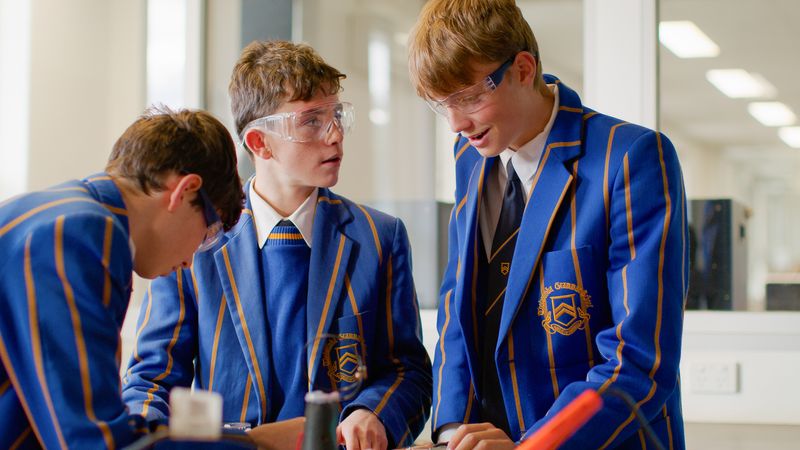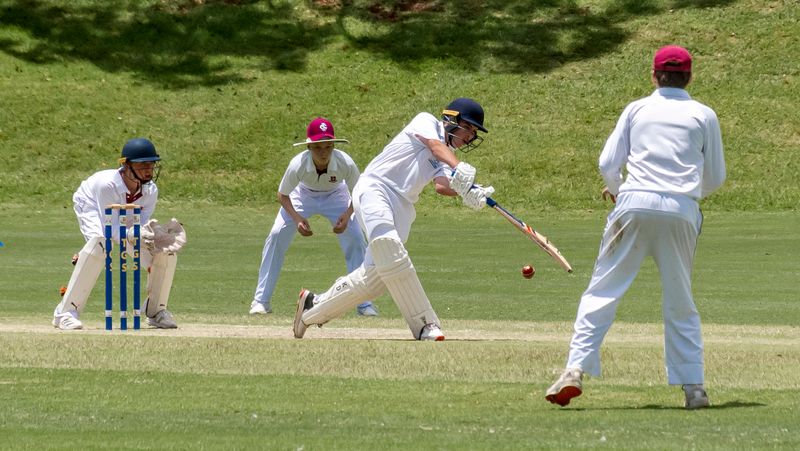“Many of the respondents spoke of controlling the controllables across six broad themes: Consistency and Routine, Using Study Tools, Environment Control, Intrinsic Motivation, Resilience and Perspective.”Mrs Crystal Hede, Director of Learning and Innovation

Giving students the opportunity to cope with disappointment has the capacity to shape their good character.
Schools are inherently hopeful and happy places. Their natural focus on growth, connectedness and preparing youth for a better future creates an optimistic atmosphere in which ambitions are born. These positive emotions and experiences lay the foundation for our expectations and while these can be highly motivating, they come with a catch: the greater our expectations, the greater the disappointments, too.
Disappointment is not a popular feeling. Rightly so, not many of us wish to feel sad, displeased or frustrated by the non-fulfilment of our hopes or expectations. However, in an academic setting, disappointments are inevitable and they can manifest in various forms. Commonly, students can find it hard to understand a concept that they see their peers comprehending and receive a lower-than-desired assessment result. Even worse, they can feel “robbed” of a grade that they believed to be rightfully theirs, not be with their preferred teacher, fall short of the required points for an academic award and face unexpected obstacles that disrupt their learning. Invariably, students will experience one or more of these things at some point in their schooling, possibly all of them, often.

For parents, it can be incredibly difficult to watch our children experience these things, especially when they result in further negative emotions such as shame or self-loathing. Sometimes, the worry we feel for our children is almost unbearable and it is natural to want to fix the problem for them. Prominent clinical psychologist, Dr Judith Locke is a leading voice on this topic. In her article, Kids need to fail. And parents need to let them; she says, “When your child is disappointed, it’s understandable you want them to feel better immediately, but taking temporary bad feelings away makes your child less capable to face inevitable trickiness in the future.” Locke goes on to say, “While I know it feels awful to watch your child be disappointed or sad, every time you help them avoid those feelings, you also sidestep them learning essential skills of resilience and a belief they will cope if life doesn’t always go their way.”

For these reasons, we will not shield students from experiencing disappointment at TGS. Doing so would be detrimental to their development and this fails to prepare them for the realities of life. Most importantly, giving students the opportunity to cope with disappointment has the capacity to shape their good character. As beautifully put by Irish politician Sir Boyle Roche, “Disappointment is the nurse of wisdom.”
I sought the wisdom of some of our older TGS students who have learned to manage their disappointments over time and even harness them for good. Specifically, I surveyed recipients of diligence awards because these recognise dedication and resilience rather than grades. All the respondents admitted to encountering setbacks and shared various versions of not letting these deter their efforts. One of the seniors said, “When faced with disappointment, I use ‘failure’ as a motivator to strive for improvement and apply the feedback I receive to make adjustments for the future.”
- Consistency and Routine: Diligent students emphasised the importance of sticking to a structured study schedule. They often study at the same time every day and for consistent durations to build a habit of regular learning.
- Using Study Tools: Many of these students use study trackers, whiteboards and diaries to reinforce learning and ensure they systematically cover all necessary material.
- Environment Control: They create and maintain separate spaces for study and relaxation to condition their minds for productive work when in the study zone. This includes removing any electronic devices from the study area.
- Intrinsic Motivation: Consistently, the diligent students spoke of a strong internal drive to improve and put in the effort required to overcome academic hurdles. This includes proactively seeking clarification or help.
- Resilience: Their responses demonstrated resilience in the form of a “bounce back” mentality. They spoke of accepting that not all decisions will be to their liking (for example, class allocations), acknowledging their negative emotions and then moving on in order to stay focused on their learning.
- Perspective: Maturely, some of the boys spoke about managing their expectations. While hopes and dreams can be powerful motivators, it’s important to balance them with realistic expectations to maintain a healthy mindset.
TGS Old Boy (2011-13) and 2024 Paris Olympic medalist, Matthew Denny recently spoke with our students, sharing some anecdotes and advice that aligned with the above sentiments. He said that one of the biggest things he learned from his career was that “Success lies on the other side of discomfort. You just need to step toward it and keep moving.” Matthew’s wise words support the notion that disappointment — a form of discomfort — is a natural and expected part of life that forms our character as we strive towards our goals and aspirations. With this in mind, our TGS boys need to keep dreaming but expect that disappointment will occur. They need to keep moving and trying and see disappointment as an opportunity for learning.
Reference
Locke, J. (2019, March). Kids need to fail. And parents need to let them. The Courier Mail. Retrieved September, 2024, from https://www.couriermail.com.au/rendezview/kids-need-to-fail-and-parents-need-to-let-them/news-story/5df007cfd72f50b4a22b03c39c127781
Latest Blog
The Importance of Routines
Routines are an important part of our daily lives, providing structure and stability. This is especially true for children in their formative years, who benefit from having consistent and predictable routines in both their school and home environments. At Toowoomba Grammar School Junior School, we believe that routines are essential for helping students thrive both inside and outside the classroom. One of the key ways in which routines help students is by providing a sense of security and…
Ten Steps Ahead - Jackie Gallagher
As a high school athlete, Jackie Gallagher had the world at her feet. She was in a unique position where she was excellent at any distance from 100m to 800m. She broke Queensland and National records and was regularly selected for State and National teams. Jackie was selected for the Australian Youth team to compete at the World Youth Championships in Canada as an U18 along with the Australian Junior Commonwealth Games and the Youth Olympics, before making the U20 Australian team to compete at…
The Makings of a Premiership
The 2022 1st V Basketball squad will be forever etched in the pages of Toowoomba Grammar School history as the first TGS team to win a GPS Basketball Premiership since the competition commenced in 1984. Head of Basketball, and 1st V Coach, Mr Kabe Cicolini has been instrumental in the growth and success of not just our leading team, but of the TGS Basketball Program as a whole. Kabe has come from a background of playing GPS sport – cricket, rugby and basketball as a student at Ipswich Grammar…
Creating a Learning Environment that Boys Enjoy
Creating an environment for students to access and engage in learning is the educational philosophy of the new Toowoomba Grammar School Head of Junior School, Mr Ken Raven. “This requires a supportive an inclusive learning environment across the school where everyone feels they can make a positive contribution,” Mr Raven stated. “I encourage evidence-informed, explicit teaching of curriculum that sparks curiosity and interest for students to engage and explore.” Parental interaction and…
Introducing our new Deputy Head of Junior School (Teaching and Learning), Mrs Chantelle Bauer
Toowoomba Grammar School is excited to welcome our new Deputy Head of Junior School (Teaching and Learning), Mrs Chantelle Bauer. Mrs Bauer brings a wealth of experience and passion to her new role, having lived and worked in the Darling Downs and Southwest Queensland region her entire life. She was born and bred in St George, attended university in Toowoomba and took her first teaching role in Roma. She has worked in various roles across the region, including Year Level Coordinator, Head of…
You can't know a student without knowing where they come from
Boarding at Toowoomba Grammar School can be described as many things such as evolving identity, growing personally and developing character in your second home, but it is also about growing your family. Head of Boyce House boarding, Mr Michael Hall and his family, certainly enjoyed that opportunity over January. Catching up with a beautiful collection of current families from Boyce House was a privilege and has helped to build the relationships of trust and care that are essential in a…
DNF (Did Not Finish)
- Dan CrookHead of Library and Information Services I was talking books with a friend the other day; an avid reader, she had been looking for some light reads in new genre for the holidays, and so had sought out the wisdom of the internet. After watching a few BookToks (Tiktok book recommendations) she’d settled on some titles and begun to read. However after investing a good amount of her time and getting half way through the first and most highly recommended book, she asked herself, and then…
TGS Boarding - A Safe, Welcoming and Joyous Community
“From a boarding perspective, enabling young boys to flourish is only achieved within a community that is safe, welcoming, and joyous. These three aspects are at the core of my boarding philosophy and are closely aligned with my fundamental values as a boarding Head of House – acceptance, resilience, and fun,” explains Mr Henry White, Head of Corfe House. Corfe House serves as the entry point for Toowoomba Grammar School’s youngest boarders (Years 5 to 7) and the skills, relationships, and…
Transitioning to Year 7 at TGS
Can you remember your first day in secondary school? It can be a time of mixed feelings - very exciting, but also quite daunting and challenging. Irrespective of whether your son is joining us from the TGS Junior School, or if they are just starting at Toowoomba Grammar School, it can appear to be the start of a long journey. It is a rite of passage in many respects but with this comes increased emotions in response to transition. The boys have a lot to digest with a new, possibly larger campus…